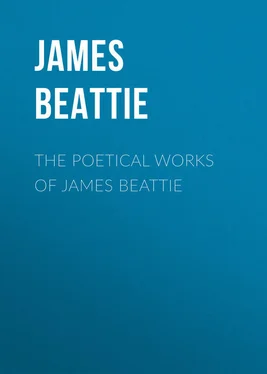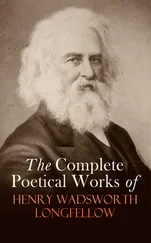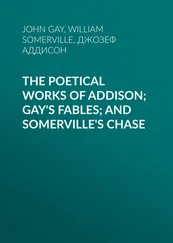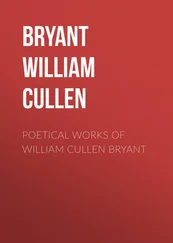James Beattie - The Poetical Works of James Beattie
Здесь есть возможность читать онлайн «James Beattie - The Poetical Works of James Beattie» — ознакомительный отрывок электронной книги совершенно бесплатно, а после прочтения отрывка купить полную версию. В некоторых случаях можно слушать аудио, скачать через торрент в формате fb2 и присутствует краткое содержание. ISBN: , Жанр: foreign_antique, foreign_prose, foreign_poetry, на английском языке. Описание произведения, (предисловие) а так же отзывы посетителей доступны на портале библиотеки ЛибКат.
- Название:The Poetical Works of James Beattie
- Автор:
- Жанр:
- Год:неизвестен
- ISBN:http://www.gutenberg.org/ebooks/41760
- Рейтинг книги:5 / 5. Голосов: 1
-
Избранное:Добавить в избранное
- Отзывы:
-
Ваша оценка:
- 100
- 1
- 2
- 3
- 4
- 5
The Poetical Works of James Beattie: краткое содержание, описание и аннотация
Предлагаем к чтению аннотацию, описание, краткое содержание или предисловие (зависит от того, что написал сам автор книги «The Poetical Works of James Beattie»). Если вы не нашли необходимую информацию о книге — напишите в комментариях, мы постараемся отыскать её.
The Poetical Works of James Beattie — читать онлайн ознакомительный отрывок
Ниже представлен текст книги, разбитый по страницам. Система сохранения места последней прочитанной страницы, позволяет с удобством читать онлайн бесплатно книгу «The Poetical Works of James Beattie», без необходимости каждый раз заново искать на чём Вы остановились. Поставьте закладку, и сможете в любой момент перейти на страницу, на которой закончили чтение.
Интервал:
Закладка:
When the poem was reprinted, one or two slight alterations were made in deference to the opinion of Gray.
In a letter to the Dowager Lady Forbes, 12th October, 1772, our author confesses that in the character of Edwin he meant to paint himself:
"From the questions your Ladyship is pleased to propose in the conclusion of your letter, as well as from some things I have had the honour to hear you advance in conversation, I find you are willing to suppose that, in Edwin, I have given only a picture of myself, as I was in my younger days. I confess the supposition is not groundless. I have made him take pleasure in the scenes in which I took pleasure, and entertain sentiments similar to those of which, even in my early youth, I had repeated experience. The scenery of a mountainous country, the ocean, the [Pg xxxviii]sky, thoughtfulness and retirement, and sometimes melancholy objects and ideas, had charms in my eyes, even when I was a schoolboy: and at a time when I was so far from being able to express, that I did not understand my own feelings, or perceive the tendency of such pursuits and amusements; and as to poetry and music, before I was ten years old I could play a little on the violin, and was as much master of Homer and Virgil as Pope's and Dryden's translations could make me."
The intense thought which Beattie had devoted to the composition of the Essay on Truth having materially injured his health, he was advised by his physicians to try the remedy of change of scene. He accordingly set out on a journey to London, and arrived there in the beginning of autumn, 1771. He was no longer the obscure individual who had visited it in 1763; 16 16 See p. xv.
he was now the triumphant adversary of scepticism, and the author of the admired Minstrel ; a man whom the most distinguished characters in the literary and fashionable world were prepared to treat with attention and respect. Among several letters of introduction, which he carried with him, was one from Dr. Gregory, of Edinburgh, to Mrs. Montagu. At the splendid and hospitable mansion of this celebrated lady, Beattie became acquainted with various persons, both male and female, who were then the chief ornaments of London society; and he used to dwell with delight on the recollections of her more private parties, made up of Lord Lyttelton, Mrs. Carter, and a few others, who spent their evenings in the most unreserved conversation on literary, moral, or religious subjects. From this time, Mrs. Montagu continued to be one of his firmest friends; and their epistolary correspondence closed only with her life. The politeness and kindness of Hawkesworth, Armstrong, Garrick, and Johnson, also contributed much to render pleasant his visit to the metropolis. Concerning the last illustrious man he writes thus: "Johnson has been greatly misrepresented. I have passed several entire days with him, and found him extremely agreeable. The compliments he pays to my writings are so high that I have not the face to mention them." In December Beattie had returned to Aberdeen.
In 1772, his mother died, at the advanced age of fourscore, at the house of her affectionate son David, in the neighbourhood of Laurencekirk.
Towards the end of April, 1773, Beattie, accompanied by his wife, set out again for London. This journey was undertaken partly for the sake of his health and partly with a view to another object – the bettering of his circumstances. The emolument which he had derived from his writings bore unfortunately no proportion to the fame he had acquired; and the small income arising from his professorship afforded him the only means for supporting his family. During his former visit to the capital, in 1771, his English friends had been very desirous to procure for him some permanent provision; and it was well known that his Majesty had expressed approbation of his writings, and had even declared his intention of conferring some reward on the man who had laboured so successfully to advance the interests of religion. With several important letters of introduction – one addressed to the Earl of Dartmouth – he now arrived in London, and was cordially welcomed by Mrs. Montagu, and his other friends. His reception by Lord Dartmouth was kind and courteous: soon after which, being summoned to wait on Lord North, he was told by that minister that an early opportunity should be taken to inform his Majesty of his arrival.
By some of his friends it had been suggested that Beattie should take orders, and enter the English church; but this mode of improving his fortunes he very properly rejected. 17At last, by the advice of the Archbishop of York, a memorial was drawn up "expressing his services, his wants, and his wishes;" which, having been transmitted to Lord Dartmouth, was by him laid before the King, who, on that occasion, spoke of Beattie and his writings with high approbation, and signified a desire to see him.
Meantime the number of our author's acquaintances in the metropolis increased daily, and his society was eagerly courted by a long list of illustrious names. He now became personally known to a distinguished churchman, with whom, during the preceding year he had held some correspondence by letter – Dr. Porteus, then Rector of Lambeth, and finally Bishop of London; and the friendship which took place between them was sincere and lasting.
At the first levee, Beattie was presented by Lord Dartmouth to his Majesty, who for several minutes talked to him concerning his Essay on Truth in the most condescending and affable manner.
Soon after this, the University of Oxford, at the installation of Lord North as its Chancellor, conferred on our author a very flattering mark of distinction, an honorary degree of Doctor of Laws.
At length the object of his wishes was attained. On the 20th of August, he received an official letter from the secretary of Lord North, informing him that the king had been pleased to allow him a pension of two hundred pounds a year. Of the private interview, with which, a few days after he was honoured by their majesties, he has left the following account in his Diary:
"Tuesday, 24th August, set out for Dr. Majendie's at Kew-Green. The Doctor told me that he had not seen the King yesterday, but had left a note in writing, to intimate that I was to be at his house to-day; and that one of the King's pages had come to him this morning, to say 'that his Majesty would see me a little after twelve.' At twelve, the Doctor and I went to the King's house, at Kew. We had been only a few minutes in the hall, when the King and Queen came in from an airing; and, as they passed through the hall, the King called to me by name, and asked how long it was since I came from town. I answered, about an hour. 'I shall see you,' says he, 'in a little.' The Doctor and I waited a considerable time (for the King was busy), and then we were called into a large room, furnished as a library, where the King was walking about, and the Queen sitting in a chair. We were received in the most gracious manner possible by both their Majesties. I had the honour of a conversation with them (nobody else being present but Dr. Majendie) for upwards of an hour, on a great variety of topics; in which both the King and Queen joined, with a degree of cheerfulness, affability, and ease, that was to me surprising, and soon dissipated the embarrassment which I felt at the beginning of the conference. They both complimented me, in the highest terms, on my 'Essay,' which, they said, was a book they always kept by them; and the King said he had one copy of it at Kew, and another in town, and immediately went and took it down from a shelf. I found it was the second edition. 'I never stole a book but one,' said his Majesty, 'and that was yours (speaking to me); I stole it from the Queen, to give it to Lord Hertford to read.' He had heard that the sale of Hume's 'Essays' had failed, since my book was published; and I told him what Mr. Strahan had told me, in regard to that matter. He had even heard of my being in Edinburgh last summer, and how Mr. Hume was offended on the score of my book. He asked many questions about the second part of the 'Essay,' and when it would be ready for the press. I gave him, in a short speech, an account of the plan of it; and said, my health was so precarious, I could not tell when it might be ready, as I had many books to consult before I could finish it; but, that if my health were good, I thought I might bring it to a conclusion in two or three years. He asked, how long I had been in composing my Essay? praised the caution with which it was written; and said, he did not wonder that it had employed me five or six years. He asked about my poems. I said, there was only one poem of my own on which I set any value (meaning the 'Minstrel,') and that it was first published about the same time with the 'Essay.' My other poems, I said, were incorrect, being but juvenile pieces, and of little consequence, even in my own opinion. We had much conversation on moral subjects; from which both their Majesties let it appear that they were warm friends to Christianity; and so little inclined to infidelity, that they could hardly believe that any thinking man could really be an atheist, unless he could bring himself to believe that he made himself; a thought which pleased the King exceedingly; and he repeated it several times to the Queen. He asked, whether any thing had been written against me. I spoke of the late pamphlet, of which I gave an account, telling him, that I never had met with any man who had read it, except one Quaker. This brought on some discourse about the Quakers, whose moderation and mild behaviour the King and Queen commended. I was asked many questions about the Scots universities; the revenues of the Scots clergy; their mode of praying and preaching; the medical college of Edinburgh; Dr. Gregory (of whom I gave a particular character), and Dr. Cullen; the length of our vacation at Aberdeen, and the closeness of our attendance during the winter; the number of students that attend my lectures; my mode of lecturing, whether from notes, or completely written lectures; about Mr. Hume, and Dr. Robertson, and Lord Kinnoull, and the Archbishop of York, &c. &c. &c. His Majesty asked what I thought of my new acquaintance, Lord Dartmouth? I said there was something in his air and manner which I thought not only agreeable, but enchanting, and that he seemed to me to be one of the best of men; a sentiment in which both their Majesties heartily joined. 'They say that Lord Dartmouth is an enthusiast,' said the King, 'but surely he says nothing on the subject of religion, but what every Christian may, and ought to say.' He asked, whether I did not think the English language on the decline at present? I answered in the affirmative; and the King agreed, and named the 'Spectator' as one of the best standards of the language. When I told him that the Scots clergy sometimes prayed a quarter, or even half an hour at a time, he asked whether that did not lead them into repetitions? I said, it often did. 'That,' said he, 'I don't like in prayers; and excellent as our liturgy is, I think it somewhat faulty in that respect.' 'Your majesty knows,' said I, 'that three services are joined in one in the ordinary church service, which is one cause of those repetitions.' 'True,' he replied, 'and that circumstance also makes the service too long.' From this he took occasion to speak of the composition of the church liturgy; on which he very justly bestowed the highest commendation. 'Observe,' his Majesty said, 'how flat those occasional prayers are, that are now composed, in comparison with the old ones.' When I mentioned the smallness of the church livings in Scotland, he said, 'he wondered how men of liberal education would choose to become clergymen there;' and asked, 'whether in the remote parts of the country, the clergy, in general were not very ignorant?' I answered, 'No, for that education was very cheap in Scotland, and that the clergy, in general, were men of good sense, and competent learning.' He asked whether we had any good preachers at Aberdeen? I said, yes, and named Campbell and Gerard, with whose names, however, I did not find that he was acquainted. Dr. Majendie mentioned Dr. Oswald's 'Appeal' with commendation; I praised it too and the queen took down the name, with a view to send for it. I was asked, whether I knew Dr. Oswald? I answered, I did not; and said, that my book was published before I read his; that Dr. O. was well known to Lord Kinnoull, who had often proposed to make us acquainted. We discussed a great many other topics; for the[Pg xlviii] conversation, as before observed, lasted for upwards of an hour, without any intermission. The Queen bore a large share in it. Both the King and her Majesty showed a great deal of good sense, acuteness, and knowledge, as well as of good nature and affability. At last the king took out his watch (for it was now almost three o'clock, his hour of dinner), which Dr. Majendie and I took as a signal to withdraw. We accordingly bowed to their Majesties, and I addressed the King in these words: 'I hope, Sir, your Majesty will pardon me, if I take this opportunity to return you my humble and most grateful acknowledgments, for the honour you have been pleased to confer upon me.' He immediately answered, 'I think I could do no less for a man who has done so much service to the cause of Christianity. I shall always be glad of an opportunity to show the good opinion I have of you.' The Queen sate all the while, and the King stood, sometimes walking about a little. Her Majesty speaks the English language with surprising elegance, and little or nothing of a foreign accent. There is something wonderfully captivating in her manner; so that if she were only of the rank of a private gentlewoman, one could not help taking notice of her, as one of the most agreeable women in the world. Her face is much more pleasing than any of her pictures; and in the expression of her eyes, and in her smile, there is something peculiarly engaging. When the Doctor and I came out, 'Pray,' said I, 'how did I behave? Tell me honestly, for I am not accustomed to conversations of this kind.' 'Why, perfectly well,' answered he, 'and just as you ought to do.' 'Are you sure of that?' said I. 'As sure,' he replied, 'as of my own existence: and you may be assured of it too, when I tell you, that if there had been any thing in your manner or conversation which was not perfectly agreeable, your conference would have been at an end in eight or ten minutes at most.' The Doctor afterwards told me, that it was a most uncommon thing for a private man, and a commoner, to be honoured with so long an audience. I dined with Dr. and Mrs. Majendie, and their family, and returned to town in the evening, very much pleased with the occurrences of the day."
Читать дальшеИнтервал:
Закладка:
Похожие книги на «The Poetical Works of James Beattie»
Представляем Вашему вниманию похожие книги на «The Poetical Works of James Beattie» списком для выбора. Мы отобрали схожую по названию и смыслу литературу в надежде предоставить читателям больше вариантов отыскать новые, интересные, ещё непрочитанные произведения.
Обсуждение, отзывы о книге «The Poetical Works of James Beattie» и просто собственные мнения читателей. Оставьте ваши комментарии, напишите, что Вы думаете о произведении, его смысле или главных героях. Укажите что конкретно понравилось, а что нет, и почему Вы так считаете.












